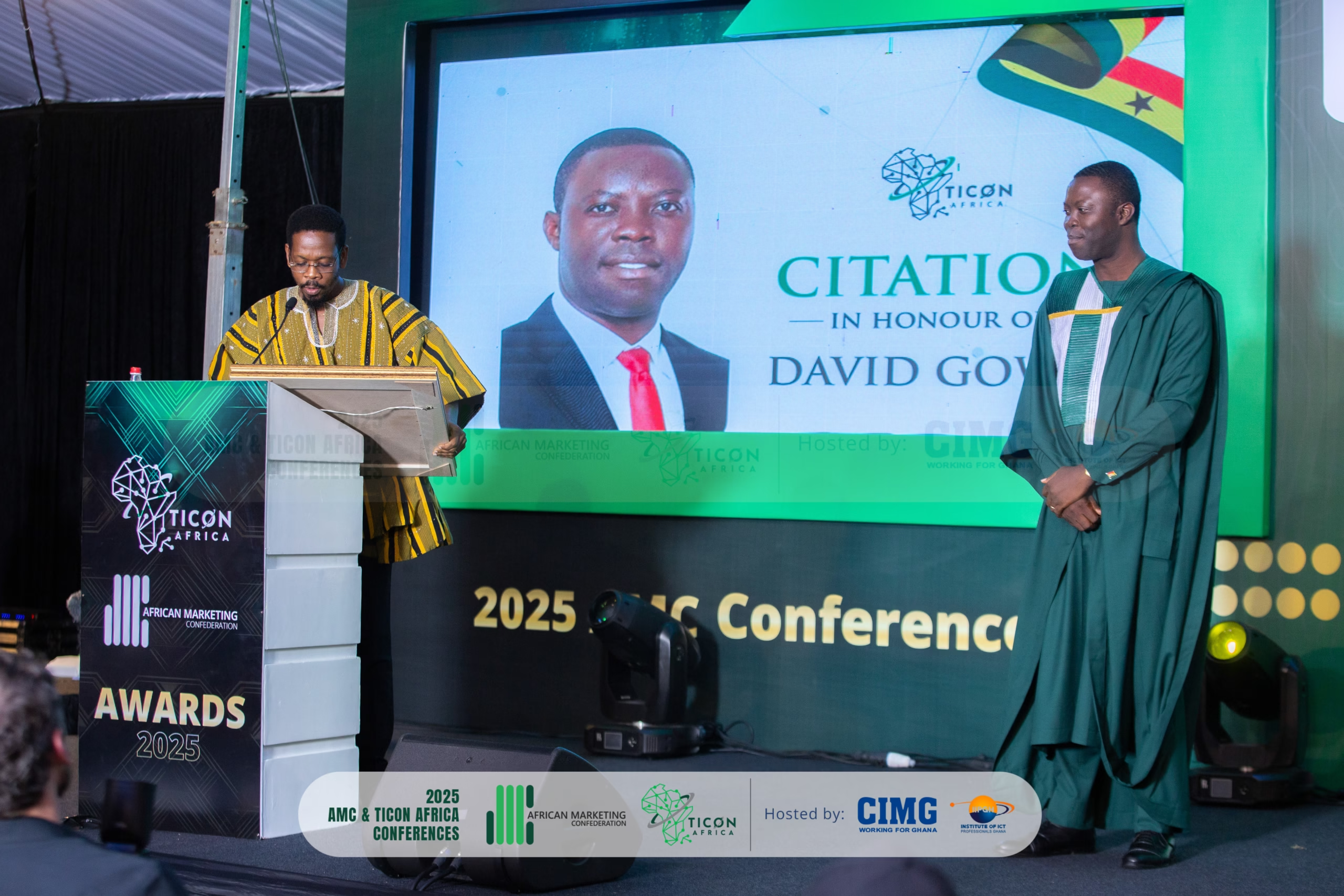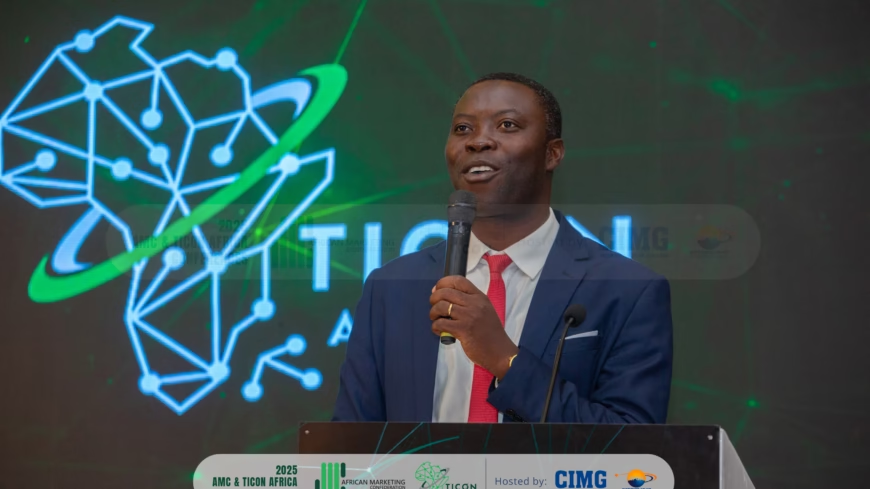Accra, Ghana – August 20, 202
The President of Technology Information Confederation Africa (TICON Africa), David Gowu, has outlined a strategic vision for Africa’s digital future, emphasizing regional collaboration, professional standards, and global competitiveness. Speaking at the opening plenary of the AMC–TICON Africa 2025 Joint Conference held at Labadi Beach Hotel in Accra, Mr. Gowu highlighted the organization’s growth, key initiatives, and Ghana’s role in driving innovation across the continent.
The conference, jointly hosted by the African Marketing Confederation (AMC), the Chartered Institute of Marketing Ghana (CIMG), and the Institute of ICT Professionals Ghana (IIPGH), brought together over 500 delegates from across Africa and beyond. It marked a significant milestone in Africa’s journey toward digital transformation, inclusive trade, and cross-sectoral collaboration.

TICON Africa was founded in 2022 in Victoria Falls, Zimbabwe, with five member countries: South Africa, Ghana, Uganda, Zambia, and Zimbabwe. Since then, the organization has expanded to include associations from Kenya, Malawi, Ethiopia, Rwanda, Botswana, Lesotho, Nigeria, Togo, Tanzania, and Cape Verde. TICON Africa President described this expansion as a reflection of Africa’s readiness to lead in digital innovation and policy development.
During his address, Mr. Gowu announced the launch of Africa’s Tech Pulse, TICON Africa’s official magazine, which will serve as a platform for sharing insights, documenting progress, and showcasing African innovation. He also introduced the Pan-African Certification Framework, a system designed to provide ICT professionals with qualifications recognized across borders and aligned with international standards. The framework aims to enhance professional mobility, credibility, and employability within the global tech ecosystem.
Another key initiative highlighted was the Women in TICON Africa Chapter, which focuses on supporting and advancing women in the ICT sector through access to resources, mentorship, and leadership opportunities. The President emphasized that inclusive innovation is not only equitable but essential for sustainable growth.
Turning to Ghana’s national efforts, Mr. Gowu cited the development of the Ghana-UAE Tech and Innovation Hub in Dawa, a $1 billion investment expected to attract over 11,000 global companies. The hub, backed by the UAE’s Ports, Customs and Free Zone Corporation (PCFC), will host major technology firms including Google, Apple, Microsoft, Oracle, Meta, IBM, and Alphabet. He described the project as a launchpad for African innovation and a catalyst for trade and investment.
He also referenced the One Million Coders Programme, which aims to train young Ghanaians in artificial intelligence and machine learning. Supported by partnerships with Huawei, MTN, Amazon Web Services, and Oracle, the initiative is designed to build a generation of skilled digital professionals capable of solving local and global challenges.
Ghana’s National AI Strategy, according to the TICON Africa leader, is focused on responsible innovation, data sovereignty, and inclusive growth. Local companies such as Npontu Technologies are already deploying AI solutions in education, healthcare, and finance. Mr. Gowu cited Snwolley mobile, Npontu’s AI application, as an example of how homegrown innovation is addressing real-world problems.
The conference is guided by two themes: AMC’s “Thriving in Africa’s Evolving Markets: Trust, Trends, and Technology” and TICON’s “Empowering Africa’s Tech Future: Innovation, Standards, and Global Influence.” These themes reflect the convergence of marketing and technology as drivers of Africa’s competitiveness and global relevance.
Delegates participated in domain-specific breakout sessions, exhibitions, and panel discussions featuring experts from across Africa and the global stage. Keynote speakers included Girish Sharma, Managing Director & CEO of Guinness Nigeria, and Prof. Douglas Boateng, Africa’s first Professor of Supply Chain Management. Sharma emphasized the importance of brand trust and consumer engagement in evolving markets, while Boateng highlighted the strategic role of supply chain innovation in driving sustainable growth and competitiveness.
On the technology front, Prof. Anthony Wong, President of the International Federation for Information Processing (IFIP), led a high-level panel discussion on AI and Data Governance. The session explored ethical, regulatory, and strategic dimensions of emerging technologies in Africa, sparking critical dialogue on how African nations can shape responsible AI ecosystems that reflect local values and global standards.
In a significant gesture of support for capacity-building, IFIP Vice President Joice Benza presented scholarships to three professionals from member associations—Institute of ICT Professionals Ghana (IIPGH), ICT Association of Uganda (ICTAU), and ICT Association of Malawi (ICTAM). These scholarships will support master’s degree studies in emerging technology domains, reinforcing IFIP’s commitment to nurturing Africa’s next generation of digital leaders.
Evening activities added cultural depth to the conference experience. Curated by the Ghana Tourism Authority, delegates enjoyed guided tours of Osu Castle, Independence Square, and the Kwame Nkrumah Memorial Park. The cultural night and beach party celebrated Ghana’s heritage through music, dance, and cuisine, fostering camaraderie and cross-cultural exchange among participants.
The closing plenary reunited marketing and technology professionals for a final session that highlighted the importance of innovation and academic leadership. MTN Ghana presented its new application, MTN Ads, showcasing how telecoms are evolving to support digital marketing. Prof. Fred McBagonluri, President and Provost of Academic City University and Board Chair of IIPGH, delivered a keynote address emphasizing the role of academic innovation, regulatory alignment, and data governance in shaping Africa’s digital future.
The conference concluded with the announcement of the next host country for AMC–TICON Africa 2026. Following a rigorous selection process involving Malawi, Zambia, and Botswana, Zambia was officially declared the next destination. The baton was ceremonially handed over from IIPGH to the ICT Association of Zambia (ICTAZ), symbolizing continuity and shared responsibility in advancing Africa’s tech and marketing agenda.
Mr. David Gowu closed his address by thanking delegates, speakers, and partners for their participation and reaffirmed TICON Africa’s commitment to building a unified, innovative, and globally competitive digital ecosystem across the continent. He noted that the conference had set a new benchmark for excellence, collaboration, and innovation, and laid the groundwork for future engagements including policy roundtables, digital literacy programs, and regional innovation hubs.
By:
AMC-TICON Conference 2025 Organizing Committee.





